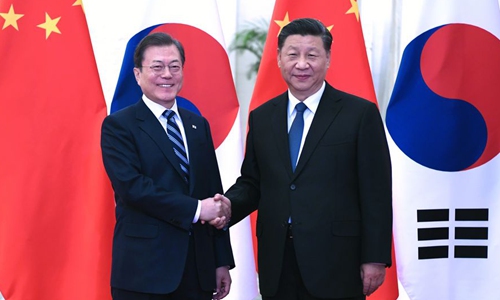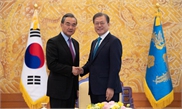Common interests bond China, South Korea closer

Chinese President Xi Jinping meets with Korean President Moon Jae-in at the Great Hall of the People in Beijing, capital of China, on December 23, 2019. Photo:Xinhua/Rao Aimin
In recent years, China and South Korea have suffered a lot from the unilateralism, egoism and hegemonism advocated by some countries. Some statements from South Korean officials show that China and South Korea undoubtedly have similar understandings of the issue. As South Korean President Moon Jae-in visited China on Monday and Tuesday, the two countries should seize the opportunity to deepen strategic trust, strengthen cooperation and deal with the challenges together.Since China and South Korea established diplomatic relations in 1992, bilateral ties have been elevated to a new level almost every five years. In 2008, the two countries upgraded their relationship from a comprehensive cooperative partnership to a strategic cooperative partnership. The upgrade of ties is reflected in many areas including economy and trade, people-to-people exchanges, cultural exchanges and mutual trust.
But since 2008, the relationship has been strained although it experienced a small upsurge from 2014 to 2015. Some people even described ties in 2016 as the worst in history. Although this seems exaggerated, it is an indisputable fact that bilateral relations are still in the difficult process of recovery.
Strategic trust is the weakest part and the most important one that China and South Korea need to strengthen in relations. The two countries should further consolidate their comprehensive cooperative partnership. Specifically, the neighbors should respect each other's core interests, undertake strategic coordination on major issues and strengthen cooperation in national defense and security. As they enhance strategic cooperation, their strategic trust will be further strengthened.
China will not bully or take advantage of South Korea. However, South Korea should not be a US outpost to contain China. For most of the past 10 years, China-South Korea relations have not been good. This is because South Korea chose to serve US interests despite knowing that Washington wanted to contain China. South Korea believes that only by strengthening its alliance with the US can it have a say when facing China. This is what the US has been preaching to its trusted ally.
Deploying Terminal High Altitude Area Defense does not mean South Korea-US relations are good, or that South Korea is safer. Even at times when Seoul-Washington ties were good, China wouldn't fear South Korea.
The reason why the US dare to bully South Korea is precisely because Seoul is strategically over-reliant on its ally. South Korea becomes nervous once the US hints that it may cut the size of its troops in the country. Washington also deliberately amplifies and takes advantage of Seoul's fear.
South Korea's biggest weakness lies in its urgent need to resolve the nuclear issue on the Korean Peninsula and maintain peace and stability in the region. China and South Korea have similar views on the issue. As China-South Korea relations get better, the peninsula will have more peace and stability, because China does not want any trouble there.
This is different from some countries which always want to keep the peninsula moderately tense so as to maintain their own interests, such as selling weapons and maintaining military presence.
China and South Korea are currently facing common challenges, overcoming which is an opportunity for the two to strengthen strategic cooperation. We hope that Moon's visit helps China and South Korea improve consensus on these issues, jointly maintain peace and stability on the peninsula and open up a new stage for relations.
The author is director and professor at the Center for Korean Peninsula Studies at Shanghai University of International Business and Economics. opinion@globaltimes.com.cn

